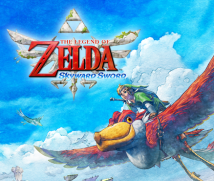5. ''I’ll Never Play the Old Way Again!''
I think being able to switch the items you’re carrying with ease was one key to being good at playing The Legend of Zelda games so far.
I agree with that.
But this time, that element of game operation has suddenly changed and the flow of gameplay has become incredibly natural.
That’s true. The actions from choosing an item with the Wii Remote Plus to using that item connect smoothly, so gameplay has become seamless.
You can select items this time while moving Link.
Huh?
When an enemy is about to beat Link, you drink potion from a bottle in order to restore his hearts.
Yes.
In previous titles, that scene was portrayed via a cinematics-like moment while gameplay is interrupted, but this time it fits in seamlessly, so, for example, if a boss is about to finish you off, you can run for your life and gulp down some potion to restore your health.
It isn’t very seemly behaviour, though. (laughs)
I guess not. (laughs)
The other day, Miyamoto-san said, “I’ll never be able to play the old way again!”
Yes, he’s been saying that.
But I would imagine that Wii MotionPlus presents a new challenge to the overwhelming majority of players out there. They must feel uneasy about the controls changing so dramatically.
I suppose so.
Tanaka-san, as a developer of the game, what would you say to people like that?
I’d like people who feel they aren’t very good at button controls to feel more confident about this game. I think some people have felt that with controllers until now there was a distance between themselves and the gameworld, but this time, when you want to do something, it is easy to affect Link’s movement via Wii MotionPlus, so the gameworld feels much closer. I would recommend they give it a try.
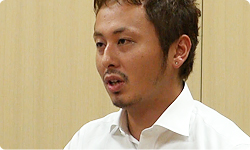
How about you, Kobayashi-san?
I was involved in development of Wii Sports. I wasn’t in charge of Tennis, but that game distinguished between forehand and backhand shots.
You can swing the racket whichever way you want, from the right or the left.
After growing accustomed to those controls, I played another tennis game and thought, “Oh...the racket’s a button.” (laughs)
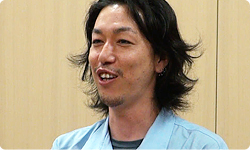
Using buttons as controls felt strange.
That’s right. When making this game, to confirm specifications, I played The Legend of Zelda: The Wind Waker and tried to swing the sword in whatever direction I wanted and couldn’t do it. I then thought, “I can’t go back.”
I feel the same way. But the controls are new, so some people will feel something is a little off for the first 10 or 15 minutes.
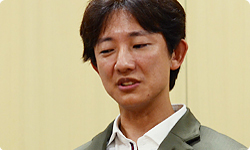
Because the manner of playing is so different than before.
But they’ll gradually get used to it and the next thing they know, they’ll feel like something is off about games you control by punching buttons.
And you, Aonuma-san?
I feel as if Wii MotionPlus, and the Wii Remote Plus, have completely become tools. With a conventional controller, there are all these things you have to remember, being presented the controller and pressing these buttons - like remembering the right sequences in fighting games. To tell the truth, I’m not a big fan of games like that.
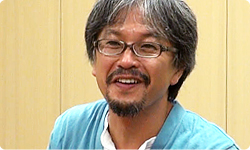
You’re not good at them? (laughs)
That’s right, I’m not! (laughs) I can’t remember the commands. But the compatibility between The Legend of Zelda: Skyward Sword and Wii MotionPlus is outstanding. Just by swinging the remote, or tilting it, or rotating it, you can perform all kinds of actions, so there’s no need to remember anything. I hope people will feel as if they have a new tool and try swinging it around.
I suppose it’s like gradually becoming able to use a brush better, or a chisel.
Yes, it is. Or maybe a musical instrument. As you’re using it, your body grows familiar with it and you gradually master the use of it.
Like Miyamoto-san said, it’s part of your muscle memory.
Yes, your body remembers it. So whatever you do, you can’t go back to the way controls used to be. When I watch people play at game shows, I think it’s interesting how everyone plays a different way.
You can handle this tool any way you want, so each user’s personality comes out.
That’s right. It’s interesting how some people move their body a lot and swing around the Wii Remote Plus, while some people make little discrete movements around their waist to move it.
You can use the Wii Remote Plus without moving it a whole lot.
Yes. When you get tired, you can use less strength and play using less taxing movements.
Development took five years. How were you able to keep going for so long?
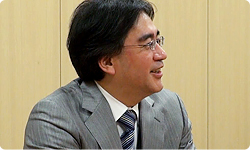
As mentioned earlier, Miyamoto-san really praised us when we came up with the method of item selection. At that time, we felt a great sense of accomplishment as if we had climbed a big mountain, so we just kept saying, “All right, on to the next mountain.”
We got really motivated then and said, “We can do this!”
You were giving each other high fives! (laughs)
Yes. (laughs) When we made that item selection system, everyone knew which direction to go. Not that many new items appear this time, but we wanted make each item or function as good as it could be. Everyone on the staff felt like if they really polished it up, it would turn out good.
(nodding)
And that’s what turned it into a Zelda game with a dense concentration of content.
I believe so.
We really enjoyed making it.
We worked every day, hoping that players would enjoy it.
It became a habit to say, “That’s one more thing that’s cool now.”
And “That’s one more thing that the players can enjoy.”
I see. You built up hundreds of individually interesting elements, like stacking up hundreds of thin pieces of paper until there’s a thick pile.
That’s right. Well, we did get a long time for development. (laughs)
Not just to make new things, but we also had plenty of time to make adjustments.
I don’t think we wasted any time.
But you told me earlier, “We’ll be done by spring.” (laughs)
Uh...yes. (laughs)
You plan to hold a number of “Iwata Asks” sessions over The Legend of Zelda: Skyward Sword, don’t you?
Yes.
Do you plan to have one just focusing on the trouble we had with the development schedule?
Like “Iwata Asks: The Legend of Zelda: Skyward Sword: Development Schedule Difficulties”? (laughs)
Yes, yes, like that! (laughs)
Huh? No thanks. I’ll sit that one out! (laughs)
(laughs)
Good work, everyone.
Thank you!
